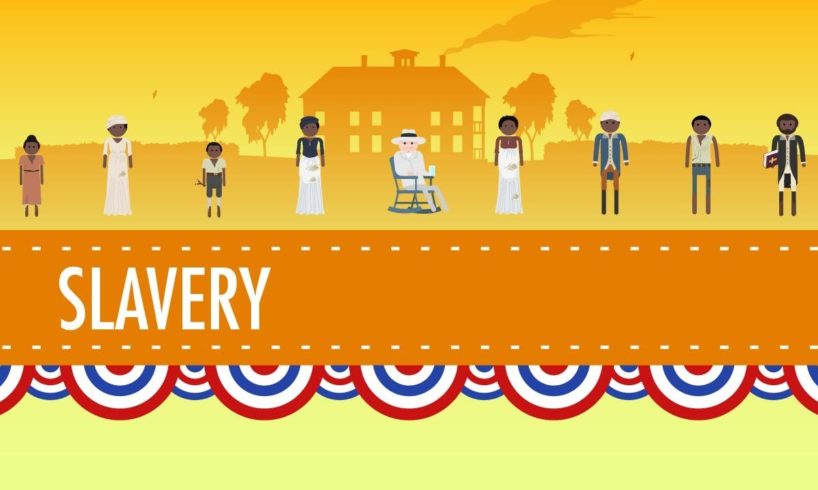
In which John Green teaches you about America’s “peculiar institution,” slavery. I wouldn’t really call it peculiar. I’d lean more toward a horrifying and depressing institution, but nobody asked me. John will talk about what life was like for an enslaved person in the 19th century United States, and how enslaved people resisted oppression, to the degree that was possible. We’ll hear about cotton plantations, the violent punishment of enslaved people, the day-to-day lives of enslaved people, and slave rebellions. Nat Turner, Harriet Tubman, and Whipped Peter all make an appearance. Slavery as an institution is arguably the darkest part of America’s history, and we’re still dealing with its aftermath 150 years after it ended.
Hey teachers and students – Check out CommonLit’s free collection of reading passages and curriculum resources to learn more about the events of this episode.
Memoirs from former slaves like abolitionist Frederick Douglass provide insightful context on the harsh realities of slavery: https://www.commonlit.org/texts/the-narrative-of-the-life-of-frederick-douglass-excerpt-from-chapter-1
Others resisted the violence of slavery through open rebellion, like Nat Turner: https://www.commonlit.org/texts/nat-turner-s-slave-revolt
Abolitionists and free slaves alike had to fight against unfair laws such as the Fugitive Slave Act: https://www.commonlit.org/texts/fugitive-slave-act-of-1793
Want to learn more about the history and experiences of enslaved people in the United States? Check out these videos from Crash Course Black American History:
The Transatlantic Slave Trade (#1): https://www.youtube.com/watch?v=S72vvfBTQws
Slavery in the American Colonies (#2): https://www.youtube.com/watch?v=G4syEkyOzmY
Slave Codes (#4): https://www.youtube.com/watch?v=gu9RIGGXeNo
The Germantown Petition Against Slavery (#5): https://www.youtube.com/watch?v=XT8q6cYsVpc
The US Constitution, 3/5, and the Slave Trade Clause (#9): https://www.youtube.com/watch?v=57xUbch1viI
The Fugitive Slave Act of 1793 (#10): https://www.youtube.com/watch?v=AcdOWKiKgWU
Women’s Experience Under Slavery (#11): https://www.youtube.com/watch?v=eAe7ETfQ_aA
The Underground Railroad (#15): https://www.youtube.com/watch?v=Byh-HityBIM
Crash Course is on Patreon! You can support us directly by signing up at http://www.patreon.com/crashcourse
Want to find Crash Course elsewhere on the internet?
Facebook – http://www.facebook.com/YouTubeCrashCourse
Twitter – http://www.twitter.com/TheCrashCourse
Instagram – https://www.instagram.com/thecrashcourse/
CC Kids: http://www.youtube.com/crashcoursekids
source







y'all clearly are uneducated the north was way more racists then the south stupid
Juneteenth??🤔
please they abused their slaves
By slavery you mean amarican slavery. Kinda missing the rest of human history and just blaming it on amarican
The Bible and Quaran both support slavery and have advice on how best to treat slaves.
The USA didn't exist in 1619 it didn't exist until 1776.
If you can't even get that right how can we believe anything else you say.
“Make no mistakes slaves fought back and in the end they won”. Powerful words mr green
Happy Juneteenth from 2020. Keep up the struggle we've got a long way to go
Those pictures of Black backs ripped to pieces WILL NEVER lose their power in these eyes
So America existed in 1619?
It’s also important to note the monetary value of buying and owning slaves went up dramatically after the US outlawed the future Importation of slaves, allowing only the slaves already here to be bought and sold.
This distinction is often left out entirely when pro-slavery factions sought to further their message of how “well they treated their slaves as they were so expensive”. Their argument lacks credulity when looking at the so-called “high cost” of slaves over the 400 yr history of slavery in America.
So 2000 racists disliked this video.
Be honest this was in your recommended
The United States of America and all countries involved in the Atlantic slave trade are scarred by hundreds of years of promoting the idea that black people are not human, less than human, worthy of mistreatment, and unequal. If you think about the power of branding, all it takes is a few commercials to convince many people of an idea, let alone hundreds of years of promoting an idea in every way possible, it fascinates me that some people can't understand how hundreds of years of branding doesn't translate into post-slavery life right up to today. I mean really? After emancipation it's not like the white population just suddenly, magically accepted black people as equal. The brainwashing was too indelible and it showed itself by laws, behaviors, and attitudes that affected every part of black life from keeping black people from Equal Housing, equal education, and so much more including multiple historic examples of white people burning down wealthy black towns. So of course we see the effects today.
Christ, it’s hard & grim enough to listen to this horror story without “Mr Green Mr Green” shrieking excitably like some kind of lunatic who drinks too much coffee, calm down, teach & inform, it’s what your good at, forget the theatrics PLEEEASE!!!!
God damn it! There is no escaping the fact that this series is brilliantly informative & as a avid history buff I come back to the Crash course series time & time again because… well, it’s brilliant & its marvellously informative. But, I do wish he’d calm the hell down! I physically flinch when this (charming & clever) young man goes into his “Mr Green, Mr Green!” routine & there’s certainly no place for it in this particular episode. I don’t suppose there’s the slightest hope of toning it down just a bit?… No, I suppose not. Oh well, I shall just have to endure it then.
Black lives matter!!!👍👍👍👍👍👍
Now that's satan!…..Hell Is Real though…
Doing this for school work
This Is the history i do remember. I’m sure it’s re written these days